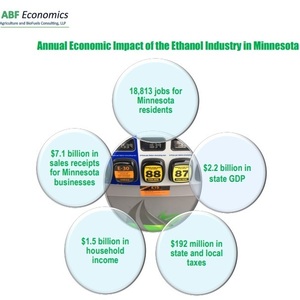Ethanol industry contributes $2.17 billion to Minnesota's economy

ABF Economics
February 26, 2018
BY Minnesota Bio-Fuels Association
Minnesota's ethanol industry remained robust in 2017, contributing $2.17 billion to the state's gross domestic product (GDP).
In a new study by ABF Economics, the ethanol industry in Minnesota produced 1.2 billion gallons of ethanol, 3.9 million tons of dried distillers grains with solubles (DDGS) and 256 million pounds of corn oil in 2017.
This in turn, it said, generated $7.13 billion in gross sales for Minnesota businesses and supported 18,813 jobs.
"This study illustrates, once again, the importance of the ethanol industry to Minnesota's economy," said Tim Rudnicki, executive director of the Minnesota Bio-Fuels Association.
ABF Economics said Minnesota's ethanol industry also contributed $1.54 billion to the state's household income and paid $192 million in state and local taxes.
Advertisement
Advertisement
Apart from agriculture jobs, the study said direct spending by ethanol plants supported jobs in the following industries: engineering, marketing and sales, logistics, power automation, emission testing, accounting, rail transportation, industrial cleaning, water management, enzyme providers, risk management service and underground tank installation.
In total, ABF Economics said the industry spent $1.87 billion on operating costs last year, 4 percent more than what it spent in 2016.
Overall, in comparison to 2016, the industry's contribution to Minnesota's GDP in 2017 grew 18.3 percent while gross sales for state businesses were 8.9 percent higher.
Full-time jobs supported by the ethanol industry in 2017 grew 11.6 percent compared to 2016, ABF Economics said.
"The ethanol industry is an important economic driver in rural Minnesota. At the same time, it supports and spurs economic activity in major urban areas of the state," Rudnicki said.
Advertisement
Advertisement
ABF Economics said Minnesota's ethanol industry used 415 million bushels of corn (28 percent of Minnesota's 2017 corn crop) to produce 1.2 billion gallons of ethanol, 3.9 million tons of DDGS (a high protein animal feed) and 256 million pounds of corn oil (which is used for biodiesel production).
It said the DDGs produced in 2017 was sufficient to meet the annual feed requirements of more than 2.5 million beef and dairy cattle or the entire inventory of cattle and calves in Minnesota.
As for corn oil, the study said the 256 million pounds produced was enough to produce 34 million gallons of biodiesel or over 26 percent of the biodiesel capacity in Minnesota.
Read the full study here.
Related Stories
Broco Energy on July 17 announced a new partnership with the Massachusetts Port Authority (Massport) to deliver and transition Massport's fuel tanks to renewable diesel across its various facilities.
Shell Aviation, Accenture, and Amex GBT on July 10 announced Avelia is in the process of evolving to an industry solution with independent data hosting and a multi-supplier model helping users access the GHG benefits of SAF.
The U.S EPA on July 17 released data showing more than 1.9 billion RINs were generated under the RFS during June, down 11% when compared to the same month of last year. Total RIN generation for the first half of 2025 reached 11.17 billion.
The U.S. EPA on July 17 published updated small refinery exemption (SRE) data, reporting that six new SRE petitions have been filed under the RFS during the past month. A total of 195 SRE petitions are now pending.
European biodiesel producer Greenergy on July 10 confirmed plans to shut down its biodiesel plant in Immingham, Lincolnshire, U.K. The company temporarily suspended operations at the facility earlier this year.
Upcoming Events










